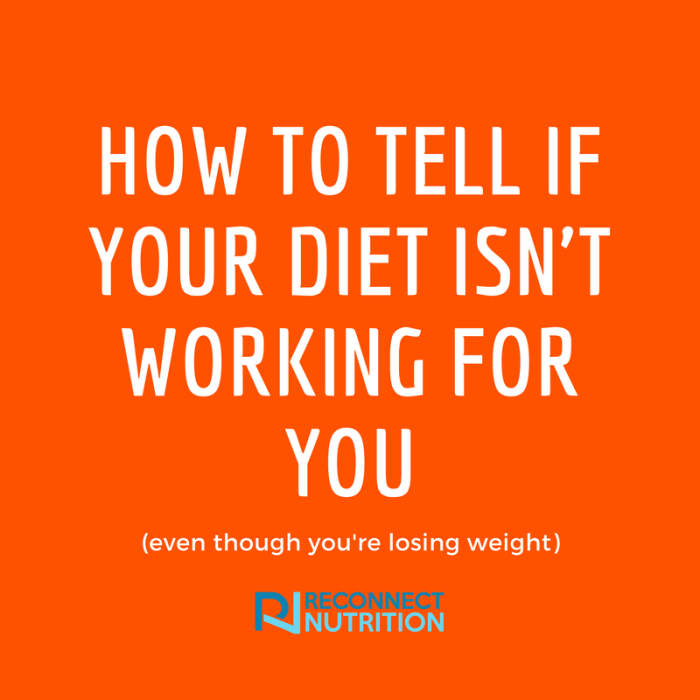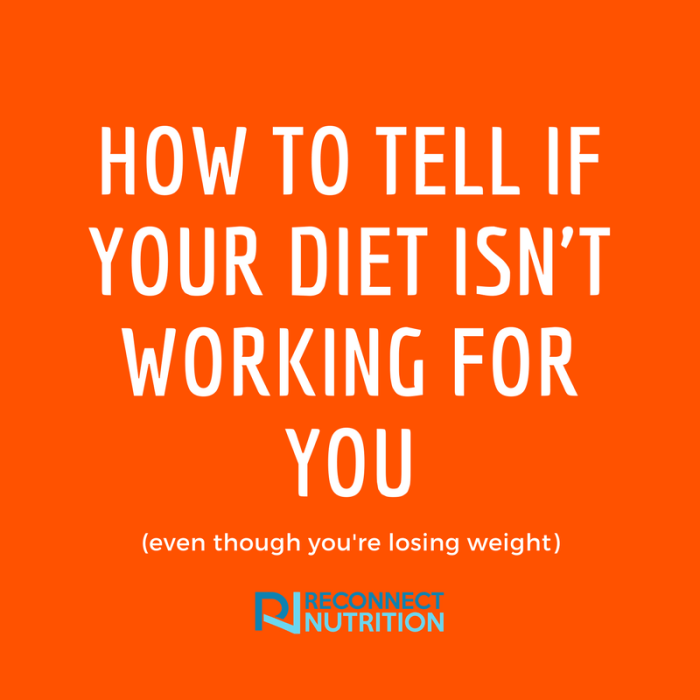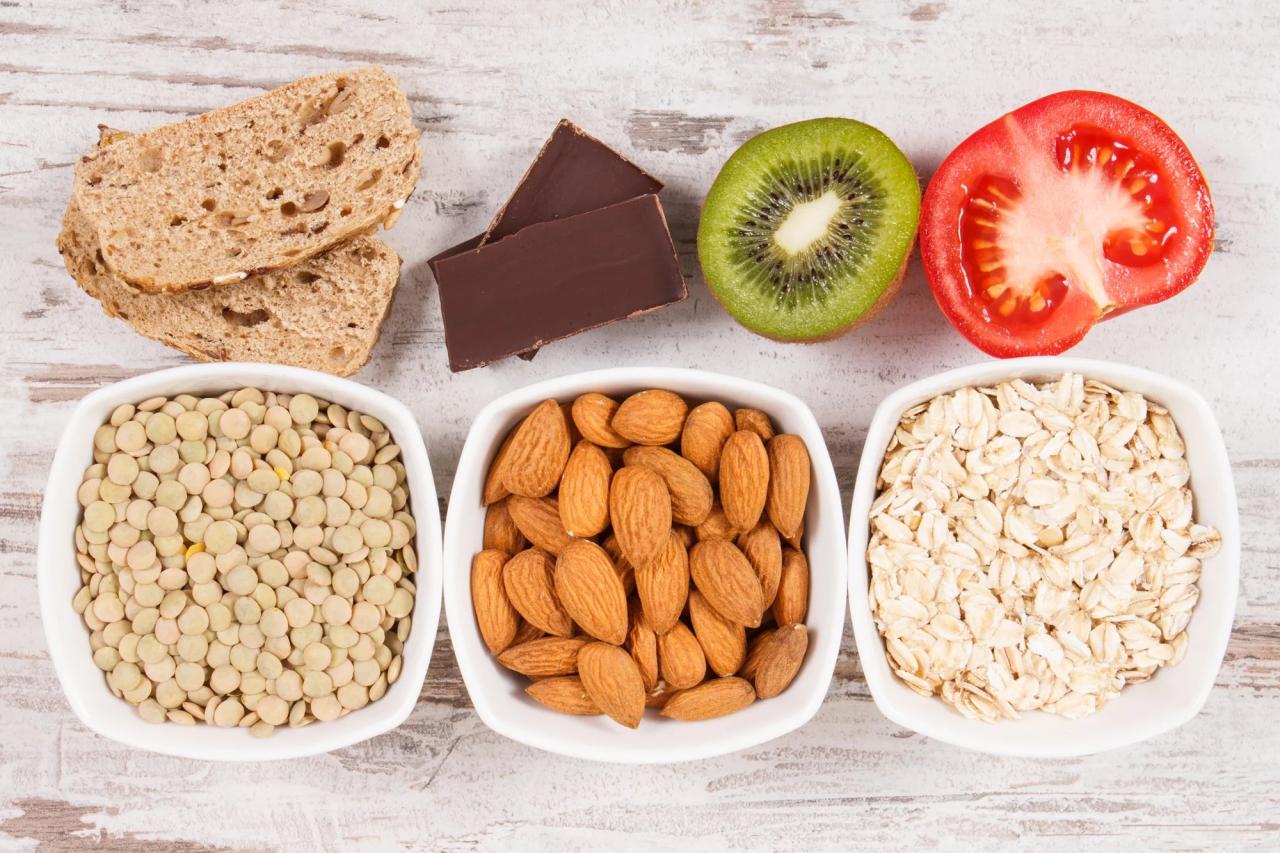Four signs your diet might not right for you: Are you constantly tired, struggling with digestion, noticing skin issues, or having trouble managing your weight? These common indicators might signal that your current dietary approach isn’t optimal. This post delves into the surprising ways your diet could be affecting your overall health, from energy levels to mood swings, and offers actionable insights to help you fine-tune your eating habits.
This exploration of potential dietary imbalances examines four key areas: energy levels, digestive health, skin health, weight management, and mood. We’ll explore how various dietary patterns, nutrient deficiencies, and specific food choices can impact these crucial aspects of your well-being.
Energy Levels and Diet
Your diet plays a crucial role in your energy levels throughout the day. What you eat directly impacts your body’s ability to function optimally, influencing everything from your mood to your physical performance. Understanding the connection between your food choices and your energy can help you make informed decisions about your diet and achieve sustained energy levels.A balanced diet provides the necessary nutrients to fuel your body effectively, preventing energy crashes and maintaining a steady flow of energy.
This means avoiding extreme dietary restrictions, and focusing on whole, unprocessed foods. Recognizing the relationship between your diet and energy levels can help you make sustainable changes to improve your overall well-being.
Common Dietary Patterns Associated with Low Energy Levels
Poor dietary habits can contribute to low energy levels. These include diets lacking essential nutrients, excessive consumption of processed foods, and an imbalance in macronutrients. A diet consistently high in sugary foods and refined carbohydrates can lead to energy spikes followed by crashes, leaving you feeling tired and sluggish.
- Diets deficient in complex carbohydrates, proteins, and healthy fats can lead to prolonged fatigue. Complex carbohydrates provide sustained energy release, while proteins support muscle function and repair. Healthy fats are crucial for hormone production and overall bodily function. Insufficient intake of these nutrients can result in feelings of weakness and lack of motivation.
- A diet excessively high in processed foods, sugary drinks, and unhealthy fats often lacks essential vitamins and minerals. These foods can lead to nutrient deficiencies, impacting energy levels and overall health.
- Skipping meals or consuming meals with limited nutrient density can cause energy dips throughout the day. This is because your body isn’t receiving the fuel it needs to maintain stable energy levels.
Nutrient Deficiencies and Excesses Impacting Energy
Specific nutrient deficiencies or excesses can manifest as fatigue or sluggishness. For example, iron deficiency can lead to anemia, causing tiredness and weakness. Conversely, consuming excessive amounts of certain vitamins or minerals can also have detrimental effects on energy levels.
- Iron deficiency: Iron is essential for oxygen transport throughout the body. Low iron levels can lead to fatigue, weakness, and difficulty concentrating. This is particularly important for women of childbearing age and individuals with certain medical conditions.
- Vitamin B12 deficiency: Vitamin B12 plays a critical role in energy production. A deficiency can result in fatigue, weakness, and neurological problems.
- Vitamin D deficiency: Vitamin D is important for calcium absorption and energy production. Insufficient vitamin D levels can lead to muscle weakness and fatigue.
- Excessive caffeine or sugar intake: While caffeine can provide a temporary energy boost, excessive consumption can lead to anxiety, jitters, and energy crashes. Similarly, a diet high in sugar can cause energy spikes followed by significant drops, leading to fatigue.
Macronutrient Ratios and Energy Levels
The proportion of carbohydrates, proteins, and fats in your diet significantly impacts your energy levels throughout the day. A balanced ratio can lead to sustained energy, whereas an imbalance can result in fluctuations.
- Carbohydrates: Complex carbohydrates, like whole grains and fruits, provide sustained energy release, preventing energy crashes. Simple carbohydrates, like sugary drinks and processed foods, provide a quick but short-lived energy boost followed by a dip.
- Proteins: Proteins are essential for building and repairing tissues. Adequate protein intake can help maintain energy levels throughout the day.
- Fats: Healthy fats, like those found in avocados, nuts, and olive oil, are crucial for hormone production and overall bodily function. They provide sustained energy and contribute to a feeling of fullness.
Consistent Energy Crashes or Spikes
Frequent energy crashes or spikes are often a sign of dietary imbalance. This can manifest as a sudden drop in energy after a meal or a constant feeling of sluggishness. Paying attention to these patterns can help you identify areas where your diet needs adjustment.
Energy-Affecting Foods
The table below shows different foods and their potential impact on energy levels.
| Food | Impact on Energy Levels |
|---|---|
| Processed snacks (chips, candy) | Initial energy spike followed by a crash |
| Whole grains (brown rice, quinoa) | Sustained energy release |
| Fruits and vegetables | Sustained energy release, rich in vitamins and minerals |
| Lean protein (chicken, fish, beans) | Sustained energy release, supports muscle function |
| Healthy fats (avocado, nuts) | Sustained energy release, supports hormone production |
Foods to Boost Energy Levels
A diet rich in certain foods can help boost energy levels naturally. These include whole grains, fruits, vegetables, lean protein, and healthy fats.
- Whole grains: Brown rice, quinoa, and whole-wheat bread provide sustained energy release throughout the day.
- Fruits and vegetables: These are packed with vitamins, minerals, and antioxidants, supporting energy production and overall health.
- Lean protein: Chicken, fish, beans, and lentils provide sustained energy and support muscle function.
- Healthy fats: Avocados, nuts, and seeds provide sustained energy and support hormone production.
- Iron-rich foods: Red meat, spinach, and lentils help prevent fatigue and weakness.
Digestive Issues and Diet

Our digestive system is a complex network, and what we eat plays a crucial role in its health. A diet that doesn’t support optimal digestion can lead to a variety of uncomfortable symptoms, impacting our overall well-being. Understanding the connection between diet and digestive health is key to making informed choices that promote a happy gut.Dietary choices often influence our gut health.
Certain foods can irritate the lining of the digestive tract, while others can nourish beneficial gut bacteria. This understanding allows us to tailor our diets for better digestive function and overall wellness. This exploration delves into the connection between diet and digestive health, highlighting common issues and providing dietary strategies for improvement.
Common Digestive Problems Linked to Diet
Digestive problems are frequently linked to dietary choices. Issues like bloating, gas, heartburn, constipation, and diarrhea can stem from eating foods that don’t agree with our individual systems. Identifying triggers and adopting dietary adjustments can significantly improve digestive comfort.
Food Intolerances and Sensitivities
Many individuals experience digestive distress due to food intolerances or sensitivities. These reactions can range from mild discomfort to severe symptoms. Common food intolerances include lactose intolerance, gluten sensitivity, and fructose malabsorption. These intolerances occur when the body struggles to digest certain food components, leading to an inflammatory response in the digestive tract.
Dietary Patterns for Digestive Health
Several dietary patterns can promote digestive well-being. A high-fiber diet is crucial, as fiber aids in regular bowel movements and promotes healthy gut bacteria. A diet rich in fermented foods, such as yogurt and kimchi, can support the growth of beneficial bacteria in the gut. A balanced diet with adequate hydration is also essential. Also, mindful eating practices can contribute to digestive health by reducing stress and promoting a calmer digestion process.
Foods That Can Trigger Digestive Issues
Certain foods are known to trigger digestive problems. Processed foods, high-fat meals, and sugary drinks often lead to bloating, gas, and discomfort. Spicy foods can irritate the stomach lining, while excessive caffeine consumption can disrupt digestive rhythms. Consuming too much or too little fiber can also contribute to constipation or diarrhea.
Examples of Bloating, Gas, and Constipation Triggers
Excessive consumption of beans, lentils, and cruciferous vegetables like broccoli and cauliflower can trigger bloating and gas. High-fat meals and fried foods can also contribute to these symptoms. A low-fiber diet, or one lacking in fruits and vegetables, can lead to constipation. Consuming too much sugar or processed foods can also impact gut health, contributing to these issues.
Gut Health and Overall Well-being
The gut plays a significant role in our overall health. A healthy gut microbiome is linked to improved immunity, better mood regulation, and a reduced risk of certain diseases. A diet rich in nutrients, fiber, and beneficial bacteria can nurture a thriving gut ecosystem, contributing to a healthier and more resilient body.
Feeling sluggish despite eating “healthy”? Maybe your diet isn’t quite right for you. Four signs could point to a problem: constant fatigue, unexplainable cravings, skin issues, and digestive woes. Sometimes, focusing less on finding the “perfect” diet and more on creating a lifestyle that nurtures your well-being can lead to a much more satisfying result. Like, remembering that to make space for creativity, stop looking for great ideas, and simply allow yourself to explore.
to make space for creativity stop looking for great ideas This shift in perspective can also be applied to your diet. So, if you’re still struggling, pay close attention to these four signs and consider adjusting your approach.
Foods Promoting vs. Disrupting Gut Health
| Foods Promoting Gut Health | Foods Disrupting Gut Health |
|---|---|
| Fruits and Vegetables (e.g., berries, leafy greens) | Processed Meats (e.g., sausages, bacon) |
| Legumes (e.g., lentils, beans) | Sugary Drinks (e.g., soda, juice) |
| Fermented Foods (e.g., yogurt, kimchi) | Fried and High-Fat Foods |
| Whole Grains (e.g., brown rice, oats) | Excessive Alcohol Consumption |
| Nuts and Seeds | Highly Processed Foods |
Skin Issues and Diet

Your skin, the largest organ in your body, is a reflection of your overall health. What you eat directly impacts its appearance and condition. From the radiant glow of healthy skin to the frustration of breakouts, your diet plays a crucial role. Understanding the connection between your plate and your complexion can empower you to make informed choices for a healthier, more beautiful you.Dietary choices have a significant impact on skin health.
Nutrients are the building blocks of healthy skin, and deficiencies or excesses can disrupt its natural function. The foods you consume can trigger inflammation, leading to breakouts, dryness, or other skin conditions. Likewise, certain dietary patterns can contribute to improved skin tone and texture. The relationship between your diet and your skin is multifaceted, requiring careful consideration of various factors.
Feeling sluggish despite eating “healthy”? Four signs your diet might not be right for you include constant fatigue, unexplained weight fluctuations, and skin issues. It’s worth considering if your diet aligns with your body’s needs. Perhaps you could also look at the habits of people who exude warmth and confidence, like those detailed in this article 6 things people who radiate warmth and confidence do in common.
Paying attention to those details might reveal some surprising connections. Ultimately, if you’re consistently experiencing these signs, it might be time to re-evaluate your approach to eating and re-adjust your diet accordingly.
Nutrient Deficiencies and Excesses
Nutrient deficiencies can lead to various skin problems. For example, a lack of vitamin C can result in weakened collagen production, leading to wrinkles and sagging skin. Similarly, insufficient zinc can cause acne and impair wound healing. On the other hand, excessive consumption of certain nutrients, like vitamin A, can also have adverse effects, potentially leading to skin dryness and irritation.
Understanding these potential impacts helps in creating a balanced diet.
Foods that Can Trigger Skin Conditions
Certain foods can exacerbate existing skin conditions or trigger new ones. High-glycemic index foods, like refined carbohydrates and sugary drinks, can promote inflammation, often leading to acne breakouts. Processed foods, packed with unhealthy fats and additives, can also negatively impact skin health. Dairy products, in some individuals, can contribute to breakouts, and other foods with inflammatory properties might worsen existing conditions like eczema or psoriasis.
Impact of Different Diets on Skin
The impact of different dietary approaches on skin health varies considerably. A diet rich in fruits, vegetables, and lean proteins, typically associated with a Mediterranean diet, often promotes healthy skin. This is because of the abundance of vitamins, minerals, and antioxidants in these foods. Conversely, a diet high in processed foods, saturated fats, and sugar may lead to more frequent breakouts and compromised skin health.
Furthermore, restrictive diets, such as those eliminating entire food groups, can potentially lead to nutrient deficiencies and affect skin health negatively.
Hydration and Skin Health
Adequate hydration is crucial for maintaining healthy skin. Drinking plenty of water helps to flush out toxins, transport nutrients, and keep the skin hydrated from the inside out. Dehydration can lead to dryness, dullness, and even premature aging. The relationship between hydration and diet is particularly important because the nutrients consumed must be properly transported and absorbed.
Feeling sluggish despite eating “healthy”? Four signs your diet might not be right for you include consistent fatigue, unexplained weight fluctuations, and a lack of energy throughout the day. If you’re looking to boost your physique, check out these chest-building exercises that don’t involve bench press: 4 chest cheat codes for a fuller chest no bench press needed.
Ultimately, a balanced approach to nutrition and exercise is key to achieving optimal health and fitness. Pay attention to how your body reacts to different foods to pinpoint any potential dietary mismatches.
Identifying Foods That Cause Inflammation
Identifying foods that trigger skin inflammation or breakouts requires careful observation and potential dietary experimentation. Keeping a food diary can help track potential triggers, noting what you eat and any subsequent skin reactions. It’s often a process of elimination, trying different dietary approaches to identify foods that lead to inflammation or discomfort.
Foods Beneficial and Detrimental to Skin Health
| Beneficial Foods | Foods to Limit or Avoid |
|---|---|
| Fruits and vegetables (rich in vitamins, minerals, and antioxidants) | Processed foods (high in unhealthy fats and additives) |
| Lean proteins (support healthy collagen production) | Sugary drinks and foods (promote inflammation) |
| Healthy fats (omega-3 fatty acids) | Dairy products (may trigger breakouts in some individuals) |
| Water (essential for hydration) | Foods high in saturated fats (contribute to skin issues) |
Weight Management and Diet
Maintaining a healthy weight is a complex process influenced by various factors, and diet plays a crucial role. A well-structured dietary approach can significantly impact weight management, enabling individuals to achieve and maintain a healthy weight. This involves understanding the relationship between food choices, portion sizes, and metabolic processes.Dietary patterns often contribute to weight gain or hinder weight loss.
Certain dietary habits, like excessive consumption of processed foods, sugary drinks, and high-fat foods, can lead to calorie surpluses and subsequent weight gain. Conversely, adopting a balanced diet rich in fruits, vegetables, lean proteins, and whole grains can support weight loss or maintenance. Understanding these patterns is essential for developing effective strategies for weight management.
Dietary Patterns Affecting Weight
Unhealthy dietary patterns frequently include a high intake of processed foods, sugary drinks, and excessive amounts of saturated and unhealthy fats. These patterns can lead to calorie surpluses and hinder weight loss efforts. Conversely, a balanced diet that prioritizes whole foods, fruits, vegetables, and lean proteins can promote weight management and overall health.
Role of Portion Control and Mindful Eating
Portion control and mindful eating are crucial for weight management. Mindful eating involves paying attention to hunger and fullness cues, eating slowly, and savoring each bite. This approach can help prevent overeating and promote a healthier relationship with food. By being mindful of portion sizes, individuals can regulate calorie intake more effectively. Portion control is a key component in achieving and maintaining a healthy weight.
Impact of Food Choices on Metabolism and Energy Expenditure
Specific food choices can significantly affect metabolism and energy expenditure. Foods high in protein tend to increase metabolic rate, while processed foods often contribute to slower metabolism. Furthermore, high-fiber foods promote satiety and can aid in weight management by keeping you feeling full for longer. Understanding these effects can inform dietary choices for optimal weight management.
Impact of Different Dietary Approaches, Four signs your diet might not right for you
Various dietary approaches exist, each with different effects on weight management. Low-calorie diets, for example, can lead to weight loss, but their long-term sustainability can vary. Mediterranean diets, rich in fruits, vegetables, and healthy fats, are often associated with weight maintenance and overall health benefits. Understanding the impact of different dietary approaches on weight maintenance can help individuals select a sustainable plan.
Chronic Weight Fluctuations and Dietary Strategy
Chronic weight fluctuations often indicate a poorly-structured dietary strategy. Significant variations in weight over time might signify a lack of consistency in dietary habits or an inability to manage calorie intake effectively. Addressing these fluctuations requires careful evaluation of dietary patterns and lifestyle factors.
Healthy Meal Plans for Weight Loss or Maintenance
| Meal Plan | Protein (grams) | Carbohydrates (grams) | Fat (grams) |
|---|---|---|---|
| Low-Carb | 100-150 | 20-50 | 50-70 |
| Mediterranean | 70-90 | 150-200 | 40-60 |
| High-Protein | 150-200 | 100-150 | 30-50 |
The table above provides a glimpse into the macronutrient content of different meal plans. These are just examples, and individual needs may vary. Consult with a registered dietitian or healthcare professional for personalized guidance.
Foods Promoting Satiety and Overeating
High-fiber foods, like fruits and vegetables, promote satiety, helping to control hunger and prevent overeating. Lean proteins also contribute to satiety, helping regulate appetite and prevent cravings. Conversely, processed foods, sugary drinks, and highly refined carbohydrates are often associated with overeating due to their low satiety value. These choices can lead to calorie surpluses and hinder weight management efforts.
Mood Swings and Diet
Our emotional well-being is intricately linked to the foods we consume. The nutrients we ingest directly impact our brain chemistry, influencing everything from focus and concentration to our overall mood. Understanding this connection allows us to make informed choices about our diet, potentially mitigating mood fluctuations and fostering a more stable emotional state.The complex relationship between diet and mood is not always immediately apparent.
While a single meal might not drastically shift our mood, consistent dietary patterns over time can significantly affect our emotional regulation. Nutrient deficiencies or imbalances can trigger mood swings, impacting our daily lives. By paying attention to the foods we eat and the impact they have on our energy levels, digestion, and overall health, we can better understand the role of diet in managing our mood.
Foods That Impact Mood Regulation
Certain foods are known to affect mood regulation due to their impact on neurotransmitter production. Carbohydrates, for example, can influence serotonin levels, a neurotransmitter associated with feelings of well-being and happiness. However, consuming too many refined carbohydrates can lead to mood swings.
Nutrient Deficiencies and Mood Swings
Nutrient deficiencies can have a significant impact on mood. For instance, a deficiency in essential fatty acids, such as omega-3s, can contribute to mood disorders. These fatty acids are crucial for brain function and the production of certain neurotransmitters. Similarly, deficiencies in B vitamins, crucial for energy production and neurotransmitter function, can also lead to mood swings and fatigue.
Dietary Habits and Mental Health
Dietary habits play a pivotal role in maintaining good mental health. A balanced diet rich in fruits, vegetables, whole grains, and lean proteins provides the essential nutrients required for optimal brain function. Conversely, a diet high in processed foods, sugary drinks, and saturated fats can negatively impact mental well-being. The impact of these dietary habits is not immediate but manifests over time, influencing mood stability and cognitive function.
Foods That Improve Mood
Many foods are known for their mood-boosting properties. Fruits like bananas and berries are rich in vitamins and antioxidants, which can support overall well-being. Leafy greens are packed with nutrients that support brain health. Lean proteins, like fish and poultry, are essential for building and repairing tissues, contributing to a stable mood.
Impact of Different Dietary Patterns
Different dietary patterns have varying effects on emotional well-being. A Mediterranean diet, rich in fruits, vegetables, and healthy fats, is often associated with improved mood and reduced risk of mood disorders. On the other hand, a diet high in processed foods and saturated fats may contribute to mood swings and instability.
Hydration and Mood Regulation
Adequate hydration is essential for maintaining optimal cognitive function and emotional regulation. Dehydration can lead to fatigue, irritability, and difficulty concentrating, all of which can manifest as mood swings. Drinking enough water throughout the day is crucial for supporting overall well-being.
Consistent Negative Mood Shifts and Dietary Choices
A consistent pattern of negative mood shifts may be linked to dietary choices. For instance, individuals who regularly consume excessive amounts of caffeine or alcohol might experience mood fluctuations and anxiety. Alternatively, a diet lacking in essential nutrients could lead to chronic fatigue and irritability. Regularly observing your mood after consuming certain foods can provide valuable insight into potential dietary triggers.
Comparison of Mood-Boosting and Mood-Worsening Foods
| Mood-Boosting Foods | Mood-Worsening Foods |
|---|---|
| Fruits (berries, bananas) | Processed Foods (chips, candy) |
| Leafy Greens (spinach, kale) | Sugary Drinks (soda, juice) |
| Lean Proteins (fish, poultry) | Excessive Caffeine |
| Whole Grains (brown rice, quinoa) | Alcohol (in excess) |
Closing Summary: Four Signs Your Diet Might Not Right For You
In conclusion, recognizing the subtle signs that your diet might not be serving you well is crucial for achieving optimal health and well-being. By understanding how your dietary choices affect energy levels, digestion, skin, weight, and mood, you can make informed adjustments to create a more balanced and sustainable approach to eating. Pay attention to your body’s signals, and don’t hesitate to consult with a healthcare professional for personalized guidance.











